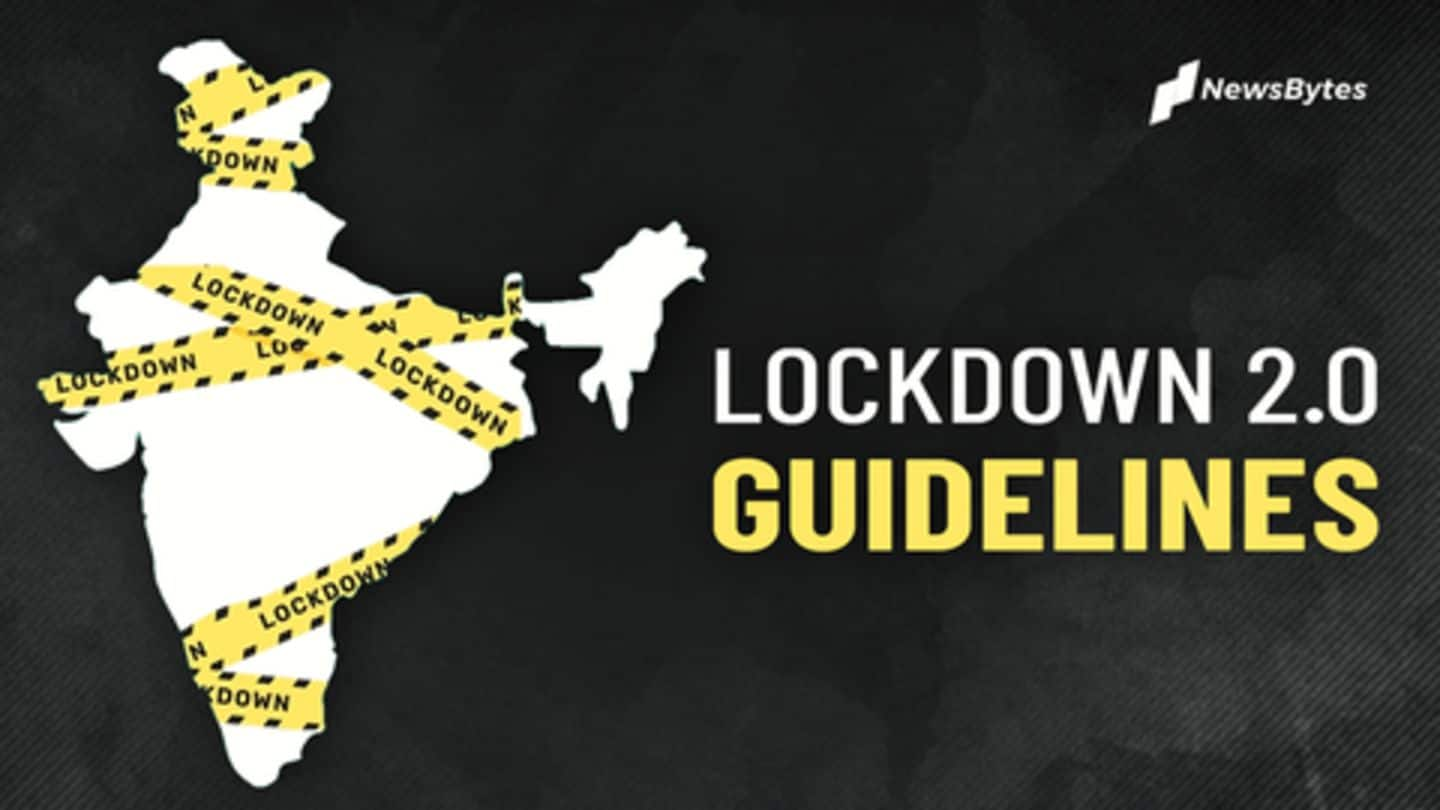
Lockdown guidelines released: Details about what's allowed and what's not
What's the story
A day after Prime Minister Narendra Modi addressed the nation declaring that the countrywide lockdown — imposed to contain coronavirus spread — has been extended till May 3, the Ministry of Home Affairs on Wednesday released revised guidelines where it was underlined that all agricultural activities will be allowed from April 20.
Select industrial activities were given relaxations from the aforementioned date too.
Here's more.
Details
Masks are compulsory, spitting made a punishable offense
The MHA has made wearing masks compulsory in public places and said spitting is a punishable offense.
A gathering of more than five people will not be allowed anywhere and District Magistrates were asked to regulate marriages/funerals.
There should be a strict ban on the sale of alcohol, gutka, and tobacco, the release said.
The release said social distancing should be followed strictly.
Details
Banks and ATMs will remain operational
In the financial sector, the government allowed RBI and RBI regulated financial markets to function. Bank branches, ATMs, IT vendors involved in banking operations, as well as IRDAI and insurance companies, were also exempted from the lockdown.
Homes for children/mentally challenged/senior citizens/destitute/women and widows will remain operational.
Anganwadis were allowed to function. However, beneficiaries were disallowed from attending Anganwadis.
Agriculture
Farming operations and procurement of items to function
All health services, including AYUSH, will remain functional in the said time period.
The government said it has decided to allow agriculture activities to mitigate the effect of lockdown on the rural sector.
As per new guidelines, farming operations and agencies involved in the procurement of agriculture items will function. Mandis that are operated by Agriculture Produce Market Committee (APMC) will also work.
Construction
Construction will continue where workers are available
The construction of roads, irrigation projects, buildings and all kinds of industrial projects, including MSMEs, in rural areas (outside the limits of municipal corporations); and all kinds of projects in industrial estates were allowed.
Construction projects, that fall under the purview of municipal corporations, was allowed only under the condition that workers don't need to be brought from outside.
Supply chain
Government also took steps to repair broken supply chain
Furthermore, the government said, "All facilities in the supply chain of essential goods, whether involved in brick and mortar stores or e-commerce companies should be allowed to operate ensuring strict social distancing within any restriction of their timing of operations."
It allowed kirana shops and carts including PDS, hygiene items, fruits/vegetables, dairy/milk booths, poultry, meat and fish, animal feed and fodder, etc. to operate.
Industries
Industries in SEZs and townships got relief, but with riders
Giving slight relief to industries, the government said that those operating in rural areas (outside the limits of municipal corporations) were made operational.
While letting manufacturing and other industrial establishments with access control in Special Economic Zones (SEZs) and Export Oriented Units (EOUs) to function, the government said these establishments shall arrange for accommodation of workers in their premises as far as possible.
What's allowed
MNREGA work allowed, preference given to irrigation
The government allowed MNREGA work to continue but said social distancing should be followed strictly. In MNREGA, priority must be given to irrigation and water conservation works.
Only goods and parcel trains will ply and as far as airlines are concerned, only cargo, relief, and evacuation movement were allowed.
Shops for truck repair and dhabas on highways were allowed to function from April 20.
Workspaces
Avoid large meetings at work places, said the government
About workspaces, the government said they should have adequate temperature screening and must keep sanitizers at pivotal points.
There should be a one hour gap between work shifts and lunch breaks must be staggered to promote social distancing.
Workplaces must be sanitized and large meetings should be avoided, the government ordered.
Manufacturing establishments should clean common surfaces and make handwashing mandatory.
Details
Institutions and religious places shut
The government asked companies to arrange special transportation for those coming from outside to ensure they don't rely on public transport. These vehicles should work only with 30-40% passenger capacity.
"Medical insurance for workers to be made mandatory," the government said.
All educational institutions and religious places will remain closed. Travel by rail and air is also prohibited.
Twitter Post
You can read the entire order here
Last... pic.twitter.com/N10d2Hlh2h
— Shiv Aroor (@ShivAroor) April 15, 2020